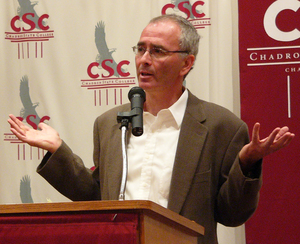Global warming is here, answers slow to follow

The question, “Is it real?” isn’t asked nearly as frequently these days as it once was when global warming is discussed, an audience at Chadron State College was told Monday night.
Author Bob Reiss said that in view of the mounting evidence more and more people, particularly scientists, have become convinced that global warming is a reality and action needs to be taken to curtail it.
Reiss said every atmospheric test and every computer model involving climatic change and weather patterns indicate that global warming is threatening to produce dramatic changes on the planet. He said whatever weather patterns a region is prone to receive, it will likely get larger doses in the future.
“Many unprecedented, catastrophic events have already occurred,” he said.
Reiss wrote a 310-page critically-acclaimed book, “The Coming Storm,” in 2001 after spending a year conducting interviews and studying data. His findings show that many naysayers who once didn’t want to believe global warming is real because it will effect their livelihood, are now convinced a problem exists.
Reiss told of several weather-related crises ranging from floods to droughts that he experienced or examined during his travels. He said that after it has had to help pay an exorbitant number of weather-related claims, the world’s second largest re-insurance company, Swiss Re, is now taking global warming into account when writing policies. He also said the British-based BP Oil Co., owner of Amoco, is among the recent converts that a problem exists because too much carbon dioxide that is the result of burning of fossil fuels is being released into the atmosphere.
Reiss said getting action to slow global warming is as much a political problem as it is a scientific one. He said that during the four years the Bush Administration has been in office, no new federal legislation has emerged and every bill introduced in Congress mentioning global warming or climate change has been killed in committee.
In order to curb the problem, Reiss said international agreements, restrictions and laws will be necessary. He noted that the Kyoto Treaty, which was recently signed by Russia and is now in effect, is “wimpy” because it has no enforcement provisions.
He also pointed out that the three largest developing countries—China, India and Mexico—are not included in the treaty. He also said China, with an abundance of coal reserves and a big surge in automobile production, will soon be spewing huge quantities of carbon dioxide into the air.
Reiss said that while some businesses and politicians view efforts to curtail the use of fossil fuels as detrimental to the economy, he believes the opposite. He said programs to develop clean energy would provide new jobs, reduce the dependence on foreign oil and allow the nation to be the leader in supplying new sources of energy.
He also advocated providing tax breaks for solar and wind energy, tightening the mileage rules for SUVs and cleaning up coal plants.
Someone in the audience asked when the point of no return in cleaning up the atmosphere might occur or if that point had already been reached. Reiss said those answers aren’t known, but the clock is ticking.
“If we don’t act now, we’ll have to pay a lot more in the future,” he stated.
Category: Campus Events, Campus News
